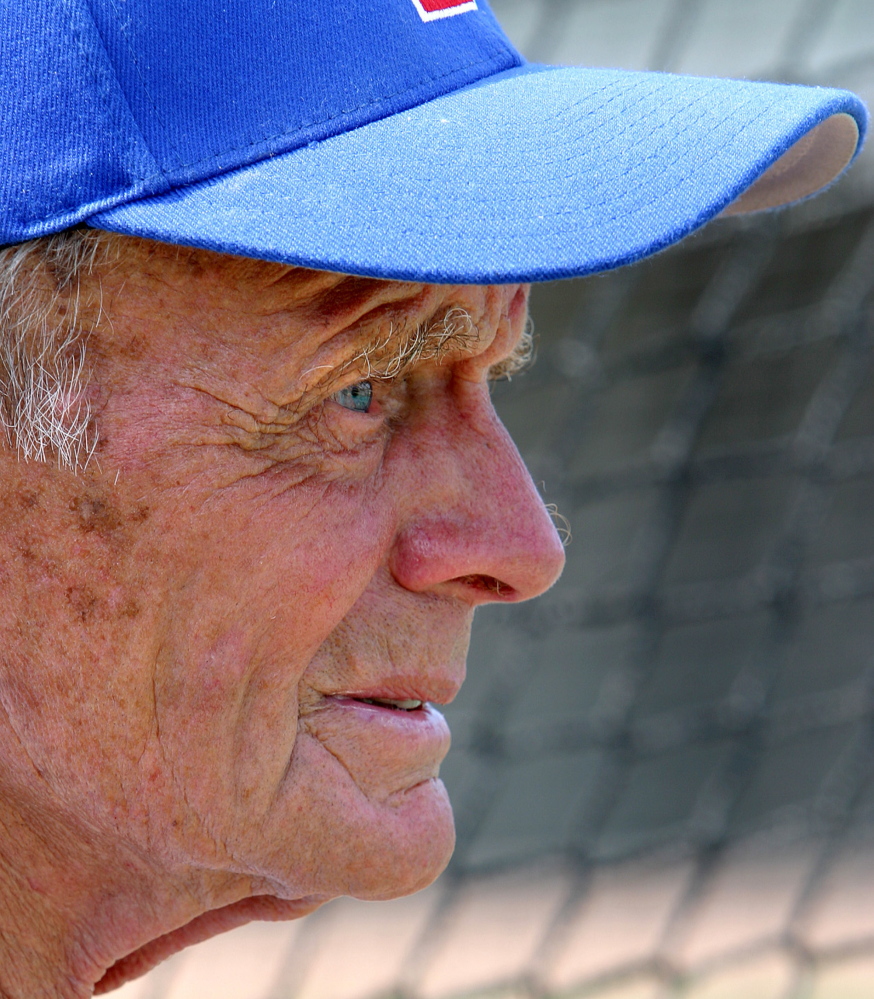Dan Rapaport doesn’t owe John Winkin a thank you. He’s said the words many times over. He’ll do it again on Sunday by joining a gathering of Winkin’s family, his former baseball players who became family and the friends who won’t let a memory die.
The celebration of the life of an extraordinary man and teacher and coach will take place in the Lorimer Chapel on the Colby College campus in Waterville. Winkin spent 20 years there before his more-publicized time at the University of Maine. Rapaport was the captain of Winkin’s last Colby team in 1974.
The celebration will be a time for storytelling. Winkin was 94 when he died on July 19 ending a remarkable life. His passion for baseball started, he once said, when his parents took him to Yankee Stadium to see the great Babe Ruth play. It continued through his college days at Duke University, playing for former major league pitcher Colby Jack Coombs and carried him through his career as a naval officer in World War II.
Winkin’s parents were professors at Columbia University. He wanted to become a teacher, too. The subject would be baseball.
Rapaport embraced baseball. He loved the broad strategies of the game and its nuances. He was also the hitter, in his words, who needed to hit a triple to get a single. He never played major league baseball. He couldn’t throw a baseball like pitcher Billy Swift or Ed Phillips or hit and field like shortstop Mike Bordick, just three of the many Winkin players who signed pro contracts.
Rapaport wanted to practice law. He was Phi Beta Kappa at Colby but scored low, he said, on his Law School Admission Test. When he applied to Cornell Law School he asked Winkin to write a letter of recommendation.
“He said don’t worry, it’ll work out. I wasn’t so sure,” said Rapaport. On his visit to the upstate New York campus, Rapaport met with the dean of admissions. “He wouldn’t tell me what was in the letter but he said, ‘for John Winkin to write what he wrote, I had to accept you.
“I guess the dean was a baseball man and knew John Winkin.”
Rapaport joined Preti, Flaherty, Beliveau and Pachios law firm in Portland in 1978, his first year out of law school. He’s still with the firm and is now a partner, living in Cape Elizabeth. Sunday morning he’ll drive 90 minutes to Waterville with his friend Augie Favazza, the Maine Sunday Telegram and Portland Press Herald sports editor when Winkin left Colby for Maine.
Rapaport grew up in Sharon, Massachusetts, a Boston suburb near Foxborough where the Patriots play. In 1968 he attended the Ted Williams Baseball Camp and Winkin was on the camp staff.
“It was the year before Ted Williams became the manager of the Washington Senators,” said Rapaport. “My junior year in high school. I’d see Ted Williams and John Winkin sitting and talking baseball. I had to go over and listen. That’s what Wink and I had in common, our passion for baseball. He saw that and recruited me to play for him at Colby.”
That fall, Rapaport took a bus from Boston to Waterville. “Wink met me at the Elm City Plaza. He had some pull and I was admitted. I wound up as a utility player.”
Rapaport’s passion for baseball never wavered which is the major reason he was named a captain in his senior year. Years later at Maine, Winkin found another Rapaport in Fred Staples, a shortstop from Oxford Hills High School in western Maine.
Staples sat out one year as a redshirt and failed to make the team the next three years. In his fifth year Staples tried out during his last season of eligibility. He was Maine’s starting shortstop in 1983. Winkin never forgot Staples’ passion and perseverance.
Mike Coutts played for Winkin at Maine and was his last assistant coach there. Winkin’s contract was not renewed in 1996. Coutts and his wife, Lynn, organized a get-together in Winkin’s honor at Val Halla Golf and Recreation Center in Cumberland in 2006. Swift came from his home in Arizona. Others came from California and Canada and just down the road in Portland.
They were men who played for him at Colby with graying hair, and men 40 years younger who played for Winkin at Husson University, his last coaching appointment before his stroke in 2007. About 60 former ballplayers came to see him.
“There were tears,” said Jay Kemble, another former Winkin assistant coach at Maine. “John was as modest as I’ve ever seen him. He was very grateful. He would do anything for his guys but I think he was afraid to get close when you played for him.”
That fear disappeared many years ago.
Sunday’s celebration begins at noon. Stump Merrill and Dick Whitmore, two longtime friends of Winkin and fellow coaches will speak and then yield to anyone else. There will be laughter and there will be tears.
John Winkin has passed.
Send questions/comments to the editors.


